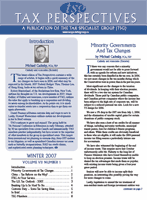
PDF Format
 Issue Contents Issue Contents
 All Issues All Issues
Winter 2007
Volume 7, Number 1
The information in Tax Perspectives is prepared for general interest only. Every effort has been made to ensure that the contents are accurate. However, professional advice should always be obtained before acting and TSG member firms cannot assume any liability for persons who act on the basis of information contained herein without professional advice.
In Brief
By Howard L. Wasserman, CA, CFP, TEP
Cadesky and Associates LLP (Toronto)
This past year was a landmark year for tax developments in Canada. Below is a brief outline of some of the more significant ones. Treaty Shopping In a key decision, the Tax Court of Canada has stated that international treaty shopping is not, in itself, abusive. In refusing to strike down a tax planning arrangement involving a company that migrated from the Cayman Islands to Luxembourg, the court held that reliance on the Canada- Luxembourg international tax treaty was appropriate in the circumstances, and not an abuse. The case, MIL Investments, is interesting for many reasons, including the well-articulated judgement of Mr. Justice Bell, and the size of the amount in dispute (a capital gain of over $400,000,000). For many years, the Canadian tax authorities had taken the position that so-called treaty shopping was abusive, and would be challenged. The general anti-avoidance rule (GAAR) was amended to specifically encompass international tax treaties. For GAAR to apply, however, there must be abusive tax avoidance. According to the Tax Court, reliance on the plain wording of a treaty will not, in itself, constitute abusive tax avoidance, regardless of whether the Canada Revenue Agency likes the result. In what may be viewed as a rebuke, it was stated that if Canada wishes to limit the application of its international tax treaties, it should put specific limitation provisions in them. Virtually all U.S. tax treaties contain so-called limitation of benefits provisions, which significantly restrict the benefits of the treaties. The case has been appealed to the Federal Court of Appeal, and tax practitioners as well as their clients will anxiously await the appeal's results. Eligible Dividends The proposal to create a two-tier dividend system in Canada will proceed, and be in force for the 2006 taxation year. Dividends from Canadian public companies will be taxed at a reduced rate. Also, dividends from Canadian private companies, where income has been subject to tax at the high corporate tax rate, will be considered eligible dividends, if so designated, and subject to the reduced rate of tax. As at the date of writing this article, the eligible dividend rules had not been passed into law, although draft legislation has been written. It is very likely that these rules will become law, and a subsequent edition of Tax Perspectives will deal with them in detail. The most obvious change resulting from these rules is the reduction in tax rates for eligible dividends. However, there are many other implications, some of which may not be immediately apparent. For example, the old rules of thumb on purchase and sale of a business where the seller traditionally has preferred to sell shares should now be revisited. An asset sale may now be preferable in some circumstances. Also, new techniques are now available in estate planning which deserve consideration. Lastly, owner-managers may wish to reconsider their remuneration strategies, taking dividends instead of bonuses, or simply leaving income in the corporation to be taxed there. Non-resident Trust & Foreign Investment Entity Rules As mentioned earlier, draft legislation was again reintroduced dealing with non-resident trusts and foreign investment entities. The legislation is virtually identical to that which was to come into force January 1, 2003. However, the effective date has now been postponed to January 1, 2007. The non-resident trust rules expand the circumstances where a non-resident trust will be subject to Canadian tax by being deemed Canadian resident. Trusts created by non-residents, to which no Canadian resident has transferred property, will still be exempt. Trusts created by immigrants to Canada will still be exempt for the first sixty months of the immigrant's residency. The foreign investment entity rules are an extremely complex piece of legislation, dealing with the taxation of foreign mutual fund type investments. These rules will affect a wide range of clients, if they come into force as proposed. The rules are unduly complex, although certain deficiencies in previous versions of the rules have been corrected. A future article in Tax Perspectives will describe these rules in more detail, if they are passed into law. Foreign Reporting — Penalties Applied The Canada Revenue Agency is now applying penalties for late-filed foreign reporting forms. The penalties range, depending on the form and its lateness, from $100 to many thousands of dollars. The penalty applies per instance of deficiency. If ten forms were required in a year, and were late, ten penalties could be applied. Anyone having uncertainty concerning the rules for foreign reporting should immediately seek qualified professional advice.
|